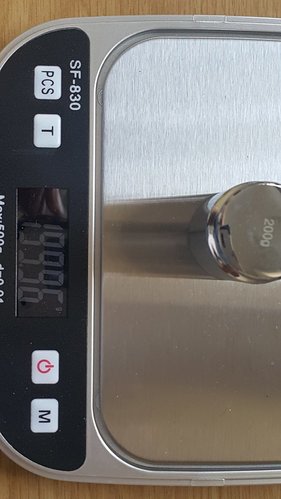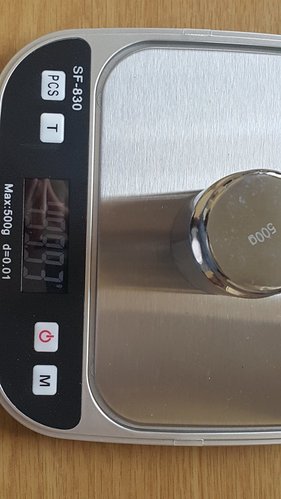I have bought the digital scale (0.01/500g). I saw you also have the calibration weights. How necessary are those? How often would one need to re-calibrate?
Navigation
Install the app
How to install the app on iOS
Follow along with the video below to see how to install our site as a web app on your home screen.

Note: This feature currently requires accessing the site using the built-in Safari browser.
More options
You are using an out of date browser. It may not display this or other websites correctly.
You should upgrade or use an alternative browser.
You should upgrade or use an alternative browser.
Calibration weights for digital scale
- Thread starter RenaldoRheeder
- Start date
Does your scale have a calibration button? If not, then no use for the weights. These digital scales usually auto calibrate on startup.
Does your scale have a calibration button? If not, then no use for the weights. These digital scales usually auto calibrate on startup.
Haven't seen my scale yet - it has been delivered, but I will only collect when I come to SA soon. Bought from Blck Vapour - so they might be able to confirm this.
Sent from my iPhone using Tapatalk
Haven't seen my scale yet - it has been delivered, but I will only collect when I come to SA soon. Bought from Blck Vapour - so they might be able to confirm this.
Sent from my iPhone using Tapatalk
Which one did you buy? This one? https://www.blckvapour.co.za/collections/accesories/products/digital-scale-0-01-500g
It cannot be calibrated manually. It auto calibrates on startup. I have one too, as well as the smaller one.
Yes that is the one. I see now when I read the detailed description that it auto calibrates. Thanks mate 
Sent from my iPhone using Tapatalk

Sent from my iPhone using Tapatalk
I stand corrected, it seems you can actually calibrate them, but the process is hidden. You have to hold the M or Units button for several seconds and then it goes into calibration mode. I didn't know that, so yes, you can calibrate them.
I stand corrected, it seems you can actually calibrate them, but the process is hidden. You have to hold the M or Units button for several seconds and then it goes into calibration mode. I didn't know that, so yes, you can calibrate them.
Thanks mate - I'll wait for Blck Vapour to respond then.
Sent from my iPhone using Tapatalk
@RenaldoRheeder I have that scale. I got the calibration weights.
Read here:
https://www.ecigssa.co.za/valley-vapour-diy-mixing-scales.t20120/page-5
@Richio I hope you don't mind...
Read here:
https://www.ecigssa.co.za/valley-vapour-diy-mixing-scales.t20120/page-5
@Richio I hope you don't mind...
@RenaldoRheeder I have that scale. I got the calibration weights.
Read here:
https://www.ecigssa.co.za/valley-vapour-diy-mixing-scales.t20120/page-5
@Richio I hope you don't mind...
@Christos - the link that you shared seems unrelated - I could not find anything about the scale there. So how often do you find that you need to recalibrate?
Sent from my iPhone using Tapatalk
@drew had the following to say in that thread:@Christos - the link that you shared seems unrelated - I could not find anything about the scale there. So how often do you find that you need to recalibrate?
Sent from my iPhone using Tapatalk
@Christos The choice is really up to you. The scales are pre-calibrated but I've seen recommendations on the interwebs that scales be calibrated at least once a year. I've just checked mine which hasn't been calibrated in about a year and it read the 500g weight at 499.86g and the 200g weight at 199.95g so it does drift with time and use.
I calibrate about once a month.@Christos - the link that you shared seems unrelated - I could not find anything about the scale there. So how often do you find that you need to recalibrate?
Sent from my iPhone using Tapatalk
Bottom line is it goes out by a few grams every so often...
Here ya go. Calibrated a month or 2 ago...@Christos, &TheV - thanks guys - will add them to my next shopping list
Sent from my iPhone using Tapatalk


Hi @RenaldoRheeder
Sorry for the delayed reply. As @Christos explained above, the scale is pre-calibrated and automatically calibrates itself once turned on but after a while it does lose some calibration so the weights are good thing to have, if you'd like to make sure it is accurately displaying the correct value.
On a side note some things which I have figured out about this specific scale
When you turn it on, give it about 60 seconds to warm up and then Tare it so it reads the correct surface on which it is placed
Make sure there's no electronic devices nearby as these tend to affect readings (especially cellphones)
We've also found that using it on a granite surface can at times cause interference with the readings
Sorry for the delayed reply. As @Christos explained above, the scale is pre-calibrated and automatically calibrates itself once turned on but after a while it does lose some calibration so the weights are good thing to have, if you'd like to make sure it is accurately displaying the correct value.
On a side note some things which I have figured out about this specific scale
When you turn it on, give it about 60 seconds to warm up and then Tare it so it reads the correct surface on which it is placed
Make sure there's no electronic devices nearby as these tend to affect readings (especially cellphones)
We've also found that using it on a granite surface can at times cause interference with the readings
Thanks. Added to the cart, so now just waiting for you to load the stirrers and I can hit the checkout 
Sent from my iPhone using Tapatalk

Sent from my iPhone using Tapatalk
Hey guys, info regarding this is mostly correct however, did someone stop to take a look at the test weights? If the weights are not calibrated the scale wont be. If your weights are out then you are going to get false readings. I know this because iv worked as a scale technician for 14 years.
Last edited by a moderator:
My scale, bought six months ago and never recalibrated, still reads around 199.8-199.9g when I place a 200g weight on it. That is plenty accurate enough for me. I'm not going to taste any difference, particularly as the most accurate you can get in mixing is down to one drop, which is a variance of around 0.025g anyway. If I have to add 0.1g of concentrate and I add until the scale reads 0.09, do I accept that as close enough or do I add another drop and maybe have the reading increase to 0.11 or even 0.12g? 0.09 is 10% out, 0.12 is 20% out. That is a far greater variance than a scale being 0.1% out.
Hey guys, info regarding this is mostly correct however, did someone stop to take a look at the test weights? If the weights are not calibrated the scale wont be. If your weights are out then you are going to get false readings. I know this because iv worked as a scale technician for 14 years.
It's also an imprecise art. Many recipe developers work in quarter or half-percent increments. Almost every cereal milk recipe that uses FW Hazelnut uses it at 0.5%. Did each and every recipe creator try it at 0.4, 0.45, 0.55 and 0.6% to see if that didn't work better? I doubt it. Some recipes, like skiddlz's God Milk, only use whole percentages, no fractions even. Did skiddlz test Cheesecake Graham Crust at 2.8 or 3.2%, rather than the listed 3%, and see if it improved/changed the mix? Again, I highly doubt it.
And then there is the possibility that you are using a concentrate that has degraded a bit over time and is only 90% as potent as the fresh concentrate that the recipe developer used. Or maybe his bottle was old and yours is fresh. So there you are 10% out again, even if you are measuring accurately down to 1/10000 of a gram.
And then we have to ask whether we can expect accuracy down to 1/100 of a gram from a R240 hobby scale. We certainly cannot expect a R299 multimeter to measure resistance accurately down to 0.01Ω. DIY scales are perhaps more accurate than DIY multimeters. But I wouldn't expect high-end-lab-bench precision from either. That is fine though because it is not required. We are making juice, not splitting the atom.
I weigh coins to see if I am in the ballpark with the scale.
I was into numismatics a few years ago and an accurate scale was very important as part of the authentication process
Sent from my iPhone using Tapatalk
Similar threads
- Replies
- 0
- Views
- 307
- Replies
- 0
- Views
- 495



